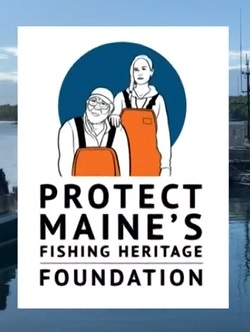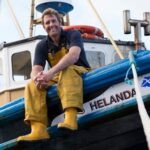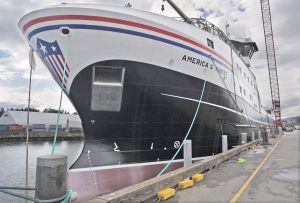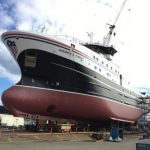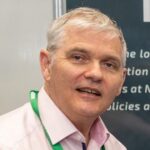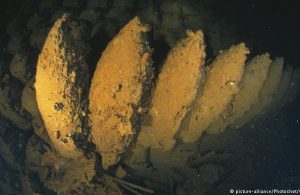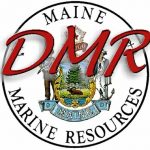Proposed Industrial Salmon Farm near Acadia an Environmental and Economic Disaster for Maine
October 27, 2021
GOULDSBORO, Maine – Frenchman Bay United, the coalition leading the opposition to a proposal by Norwegian investors to build a massive salmon in Frenchman Bay next to Acadia National Park, today submitted extensive and detailed comments on the wastewater discharge applications now under consideration by the Maine Department of Environmental Protection (DEP).
“This project will be an environmental and economic disaster for Maine,” said Henry Sharpe, president of the group. “Thirty huge salmon pens will pump 4.1 billion gallons of untreated effluent into some of the most pristine waters on the Maine coast, and information submitted by the company about its wastewater discharge is grossly inaccurate and misleading.”
Sharpe said that his group’s submission to the DEP includes data and simulations from two independent experts. One model was developed by Dr. Chris Kincaid, a physical oceanographer from the URI-Graduate School of Oceanography Coastal Hydrodynamics Lab, while another model was developed by Dr. Lauren Ross, Assistant Professor of Civil & Environmental Engineering and Faculty Fellow at the Senator George J. Mitchell Center for Sustainability Solutions at the University Maine. Both models are full, 3D dynamic models able to predict transport of water and currents over time. Despite using different modeling platforms, both independently reached similar conclusions. Waste will not flush from the bay. Waste will concentrate due to gyre circulation patterns that move around each site, and between sites. Waste will be transported throughout the upper bay and deliver nutrients to shallower, ‘phototropic’ regions where they are likely to become ‘bioavailable’ to produce algal blooms.
Neither expert used Cormix, the model employed by the applicant, American Aquafarms, a model that Sharpe said is limited to only static, 2D, 15-minute snapshots that are not appropriate for showing waste dispersal in tidal waters where waste plumes recirculate.
Other issues raised by Frenchman Bay United in its submission to the Maine DEP include:
- The way the applicant describes how it will handle and treat fish waste means that they will be operating a solid waste facility on the water, and it should be regulated as such.
- Discharges into air and water from the two proposed pen sites interact, so they should all be considered as one consolidated application, not separate applications.
- The amount of nitrogen and phosphorus being discharged from the pens are provided as statements of fact, with no validation or data to support them despite the use of new untested and unproven technology. Excessive amounts of these nutrients can cause harm to plant and animal life.
- The applicant proposes to place 30 semi-closed pens in Frenchman Bay, but the trial of the only semi-closed pen in North America (in British Columbia), half the size of the pens proposed here and the first using such a pen to raise harvest-size fish, was recently halted after less than a year due to poor water quality and high fish mortality.
- There is no discussion about how to handle mass mortality events, and the associated discharge of viruses, pathogens, disease, and rotting fish like the die-off of more than 115,000 fish that occurred last August in a salmon farm off Bass Harbor that is 1/6th the size of the American Aquafarms proposal.
- The risk of discharge and contamination from 80,000 gallons of diesel fuel stored at the pen sites is not properly addressed and the spill plan is inadequate
In Frenchman Bay United’s formal comments to the DEP the group’s attorney, David Kallin, warned that American Aquafarms “is seeking to place this new technology in the middle of a coastal wetland of special significance in Maine’s coastal waters off the shore of a national park alongside one of the most recognizable jewels of the State of Maine. Should failure of any part of these systems occur, the impacts will not be contained to semi-closed grow pens, and will have a direct and devastating environmental impact to the low-flushing bay that is vital to Maine’s tourism industry and the ocean based economy of Mount Desert Island and surrounding communities.”
“For generations, Frenchman Bay has supported a healthy and sustainable balance of different commercial and recreational uses, but this project will upend all of that by allowing one group of foreign investors to overwhelm the bay with massive amounts of water, air, noise and light pollution,” Sharpe said. “A MEPDES permit must prove that the applicant will do no harm. This application fails that basic test. It makes statements that are unsupported, or that conflict with other analyses, and it is silent on many issues that warrant careful attention. The Maine DEP should deny the discharge permits the applicant is seeking.”
In addition to submitting written comments, Sharpe said many members of the Frenchman Bay United coalition and other project opponents spoke out at a public meeting the DEP held last night on the wastewater discharge applications.
Media contacts
Crystal Canney
Protect Maine’s Fishing Heritage Foundation
207-615-5968
Ted O’Meara
Frenchman Bay United
207-653-2392
Crystal Canney
Executive Director & Spokesperson
Protect Maine’s Fishing Heritage Foundation
207-615-5968
LEARN MORE:






